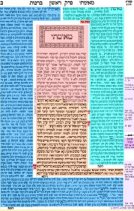|
|
 |
 |
 |
|
Birkat HaTorah -
|
|
|
Blessing for the learning of Torah
|
|
|
|
|
 |
 |
|
Talmud Torah means Torah study. Torah knowledge is the foundation for living a truly Jewish life and is one of the most basic responsibilities of a Jew. This prayer is often said as part of shacharit service in the synagogue:
|
 |
 |
 |
 |
 |
 |
 |
 |
 |
 |
 |
 |
|
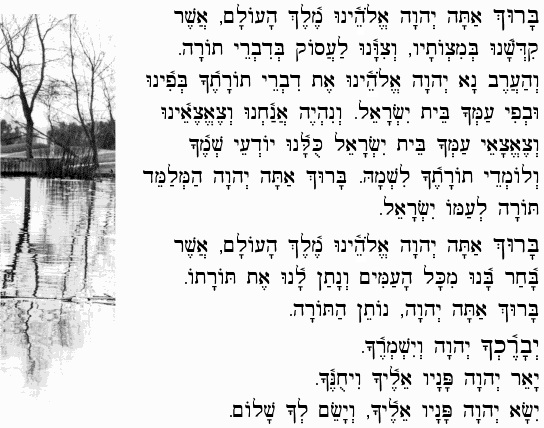 |
|
|
|
 |
|
|
|
|
|
Translation:
|
|
|
|
Blessed art Thou, LORD our God, King of the universe, who has sanctified us with His commandments and commanded us to engross ourselves with the words of Torah.
Please LORD, our God, sweeten the words of Your Torah in our mouths and in the mouths of all Your people Israel. May we and our offspring, and the offspring of Your people, the House of Israel, may we all, together, know Your Name and study Your Torah for the sake of fulfilling Your desire. Blessed are You, LORD, Who teaches Torah to His people Israel.
Blessed are You, LORD our God, King of the universe, Who chose us from all the nations and gave us the Torah. Blessed are You, LORD, Giver of the Torah.
May the LORD bless you and keep watch over you;
May the LORD make His Presence enlighten you, and may He be kind to you;
May the LORD bestow favor on you, and grant you peace.
|
|
|
|
Quotes:
"Upon three things the world stands upon; upon Torah, upon worship and upon the showing of kindness (Simeon the Righteous, Pirkei Avot).
"Israel is crowned with three crowns: the crown of Torah, the crown of priesthood, and the crown of kingship. Aaron merited the crown of priesthood as it says, "For him and his children after him will be a priestly covenant forever" (Numbers 25:13). David merited the crown of kingship, as it says, "His seed forever will be and his throne will stand opposite me like the sun" (Psalm 89:36). The crown of Torah rests, stands and awaits every Israelite, as it says, "The Torah was commanded for us by Moses; it is the legacy of the community of Jacob" (Deuteronomy 33:4). Anyone who wants it should come and partake. Perhaps one will say that the other crowns are greater than the crown of Torah? Yet, it says, "Through me kings will reign and lawmakers will establish justice; through me rulers will rule" (Proverbs 8:15-17). From here we learn that the crown of Torah exceeds them both." (Maimonides)
R. Meir says: Whoever engages in Torah for its own sake earns many things; furthermore, he is deserving of the whole world. He is called friend, beloved, and intimate of God, lover of humanity; it clothes him in humility and reverences, rendering him fit to become righteous, saintly, upright, and faithful; it keeps him far from sin and brings him near to virtue, and from him men take counsel and sound knowledge, understanding, and fortitude, for it is written, 'Counsel is mine and sound knowledge, I am understanding, I am formidable.' And it gives him kingship, dominion, and discernment; to him are revealed the secrets of the Torah, and he is becomes like a never-failing fountain, a river that never ceases to flow; he becomes modest, longsuffering, and forgiving of insult; and it magnifies him and exalts him above all things. (Pirkei Avot 6:1)
|
|
|
|
Keyword

(toh-rah leesh-MAH) n. Torah Lishmah - Study of Torah for its own sake.
|
|
|
|
Transliterated:
|
|
|
|
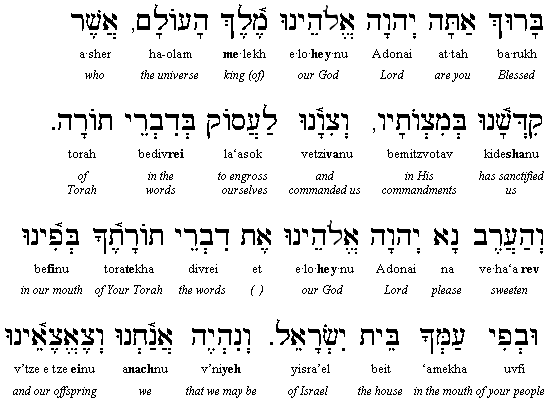 |
|
|
|
 |
|
|
|
|
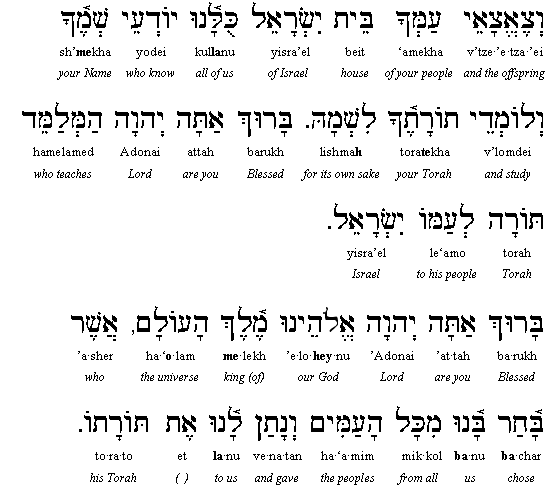 |
|
|
|
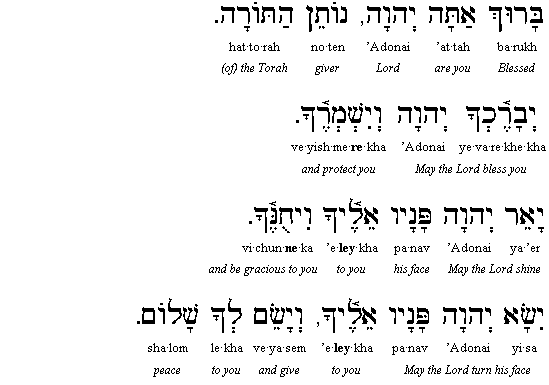 |
|
|
|
Barukh attah Adonai eloheinu melekh ha-olam, asher kideshanu b'mitzvotav, v'tzivanu la'asok b'divrei Torah. v'ha'arev na Adonai eloheinu et divrei toratekha befinu uvfi amekha beit Yisrael. V'niyeh anachnu v'tze'etze'einu v'tze'etza'ei amekha beit Yisrael kullanu yodei sh'mekha v'lomdei toratekha lishmah. Barukh attah Adonai hamelamed Torah le'amo Yisrael.
Barukh attah Adonai Eloheinu melekh ha-olam, asher bachar banu mikol ha'amim venatan lanu et torato. Barukh attah Adonai, noten haTorah.
Yevarekhekha Adonai v'yishmerekha, ya'er Adonai panav elekha vichunekha, yisa Adonai panav elekha v'yasem lekha shalom.
|
|
 |
 |
|
More about Talmud Torah
|
|
|
 |
 |
|
Talmud Torah essentially is a dialog -- between students and teachers, students and other students (havruta), and a given student and the text. This way of study can be detected by looking at the standard page layout of many classical texts. Normally the "focus text" -- which may be Talmud ("Oral Torah") or Torah -- appears at the center of the page and is surrounded by two or more levels of commentary: one or more commentaries on the text, and sometimes an additional commentary on the other commentaries.
Arguing, dialoging, and verbal wrestling is a process that leads to a deeper understanding of the text being considered.
|
|
|






